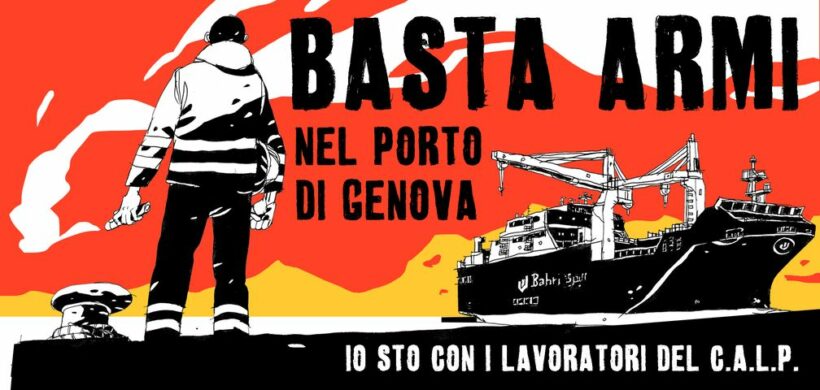As has been happening for some years, dock workers in Italy manage to combine the fight for rights against all discrimination and exploitation, with concrete initiatives alongside oppressed peoples. They have built a network between all the dock workers and for years, with a total silence from the media, they have been boycotting the transport of weapons that leave or pass through Italian ports.
“In 2021, together with the dock workers of Livorno and Naples, we boycotted a shipment of Italian missiles directed to Israel to be used against the population of Gaza. Yesterday the Palestinian trade unions launched an appeal to try to block the Israeli war machine. We have always stood out in terms of international solidarity in favor of those peoples who raise their heads against their oppressors. We are workers who do not give up and who stand alongside all peoples in struggle.” This is what Calp (Autonomous Collective of Port Workers) writes in its statement. They have repeatedly refused to be complicit in the genocide in Yemen, identifying and denouncing the Saudi ships carrying the instruments of death.
Calp is a consolidated network in all Italian ports, which better and more effectively than many beautiful speeches, than many attempts at often demagogic and conspiracy-based analyses, summarizes with extreme clarity the common thread that inextricably unites universal class consciousness to fighting wars and oppression.
And while the Italian government, first the Draghi miscellany, then the passing of the baton to Meloni, without any significant opposition, decided to send weapons to Ukraine and increase military spending, the dock workers organized strikes against the co-belligerence of Italy.
On 25 February [2023], the demonstration organized by the Calp of Genoa was also joined by the national mobilization already called by USB Mare e Porti with a 24-hour strike throughout Italy for workplace safety, so that the money intended for the escalation of war would be allocated to to protect the health of workers and to stop the passage of weapons through Italian ports. And the Municipality of Genoa itself, the only institution in all of Italy [to do that], approved a condemnation of the genocide in Gaza, thanks to the councilor of “United for the Constitution” and former senator Mattia Crucioli, who displayed the Palestinian flag in the chamber.
The dock workers’ collective was also present at the national anti-militarist demonstration in Rome on 4 November, to denounce Italy’s complicity in the extermination of many civilians in Palestine and indicate a peaceful way of struggle: the economic-commercial boycott, the civil strike. Each of us, in our own small way, can make our own contribution: look for Israeli products or companies that do business with Israel and report them, don’t buy them.
“Come help us and support us on November 10th in Genoa”, asked the CALP at the large mobilization on Saturday 4th November “wars are stopped, not celebrated”, with the massive presence of Palestinian flags. “The appeal to block the San Benigno gate, in Genoa, at dawn on Friday 10 November, is just the umpteenth act of a fight, that against the transit of armaments from the port, which the autonomous collective of port workers has been carrying for over five years,” reports Il Fatto Quotidiano.
“The logistics chain is necessary to fuel conflicts by supplying them with armaments and we do not want to be part of this mechanism”.
The mobilization of the Genoese dockworkers, which in addition to the grassroots union Usb and SiCobas finds the support of various pacifist, nonviolent and humanitarian movements and associations, follows similar protests that have been seen in recent days in Belgium and the United States, where activists and unions contest the sending of weapons to the Middle East. “The shipping company Zim has made its fleet available to bring weapons to Israel – explains Josè Nivoi, Sea and Ports representative of the basic trade union union.
“Maybe we are different, but we think that, especially in times of crisis, workers should stay united and not identify with the boss’s point of view.
We think that we must organize ourselves, and form a common front, against the working conditions that will worsen, with the layoffs that are starting to arrive. The history of the port is made of work, solidarity, struggles and workers who were able to say “NO” to injustice, fascism and war. If you lose this courage, if you give up questioning your role in this society, [if you give up] the ability not to collaborate, then you give up [your] conscience. [Then] all becomes justifiable and history has already shown how far [this] can go.
Let’s also think about the trade of arms that are forcefully returned to the port; on this too we are not and will never be indifferent. We too know how to fight a war, and not a day or night goes by in which workers don’t discuss and react. The solidarity is great and the desire to fight is very high. The results are and will be difficult to obtain, but we are not complaining.
It will be tough.
It will be risky.
It will be what we decide.”










